2024届高考英语一轮复习介词讲解课件(共39张PPT)
文档属性
| 名称 | 2024届高考英语一轮复习介词讲解课件(共39张PPT) |  | |
| 格式 | pptx | ||
| 文件大小 | 258.6KB | ||
| 资源类型 | 教案 | ||
| 版本资源 | 通用版 | ||
| 科目 | 英语 | ||
| 更新时间 | 2024-02-21 15:47:35 | ||
图片预览

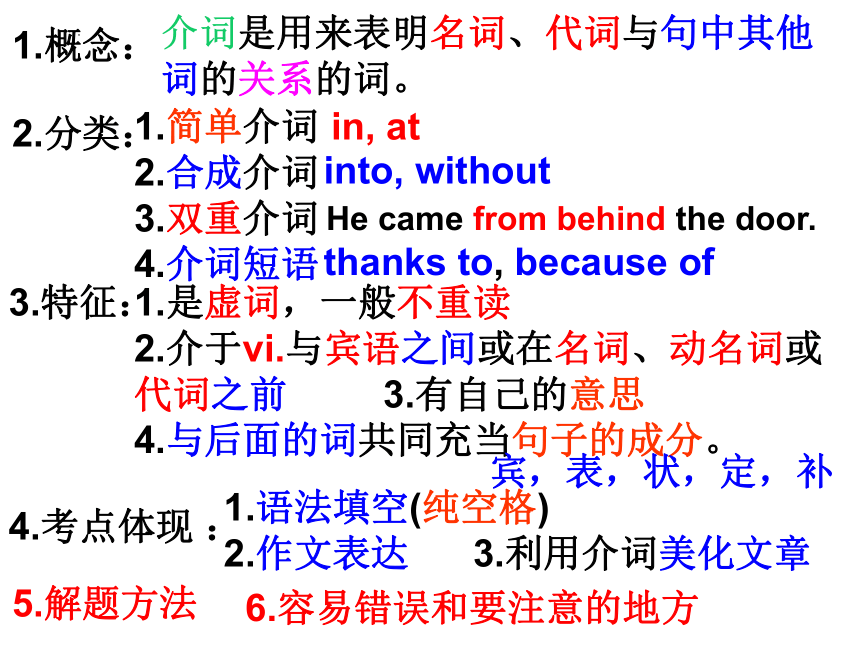

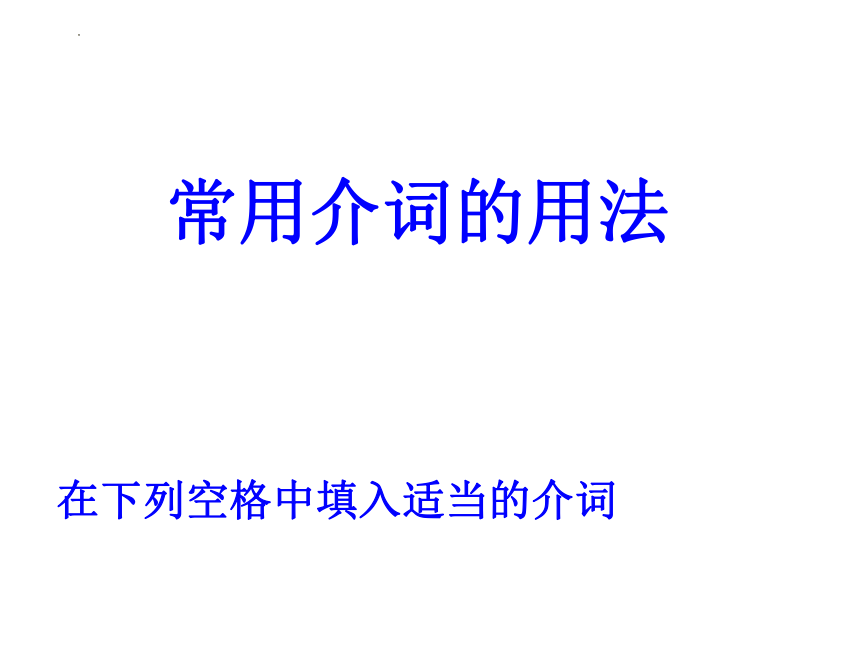
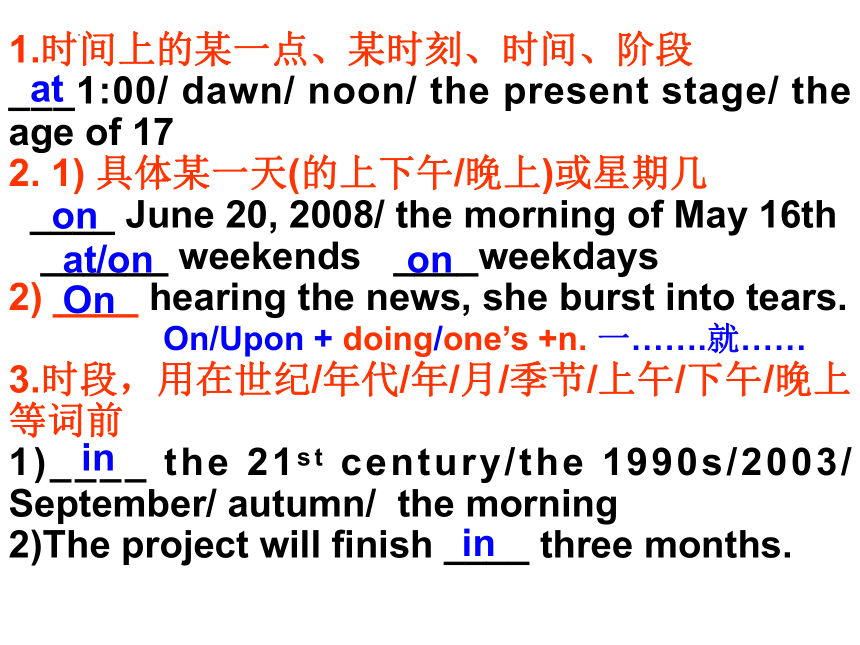
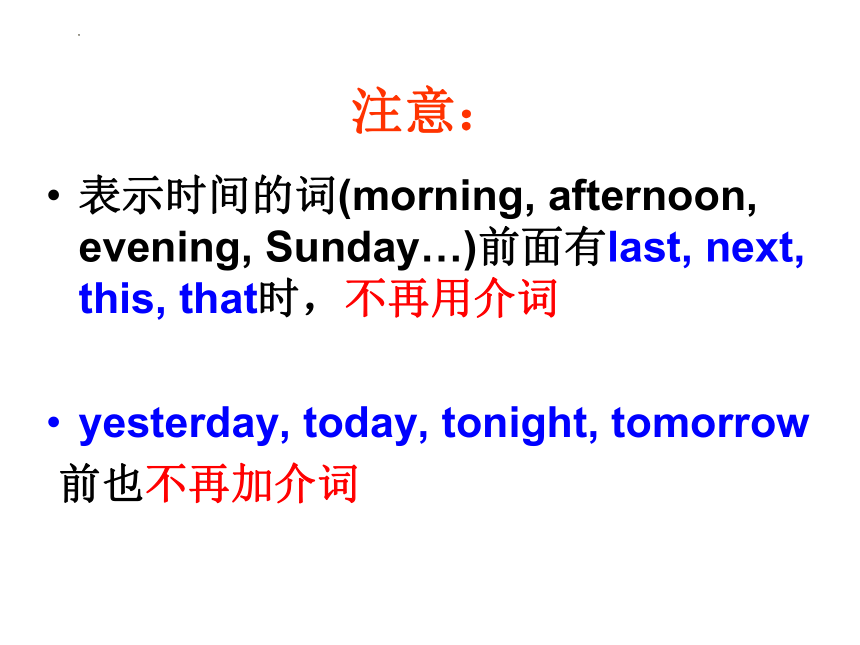
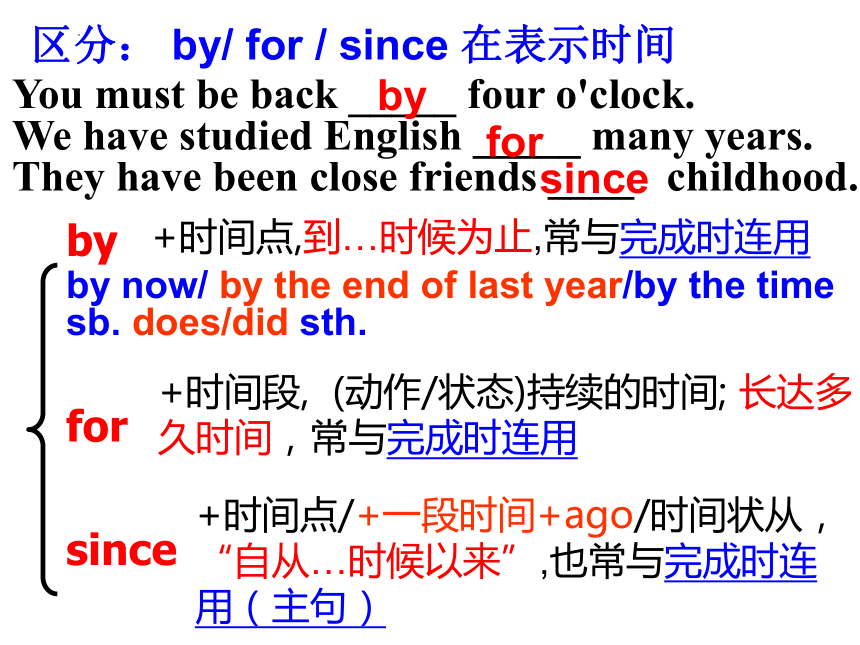
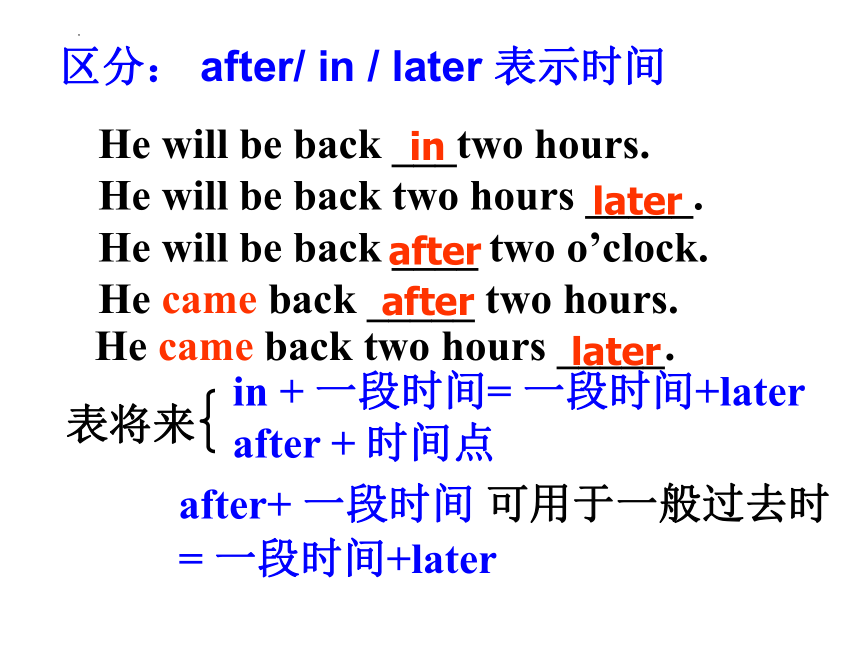
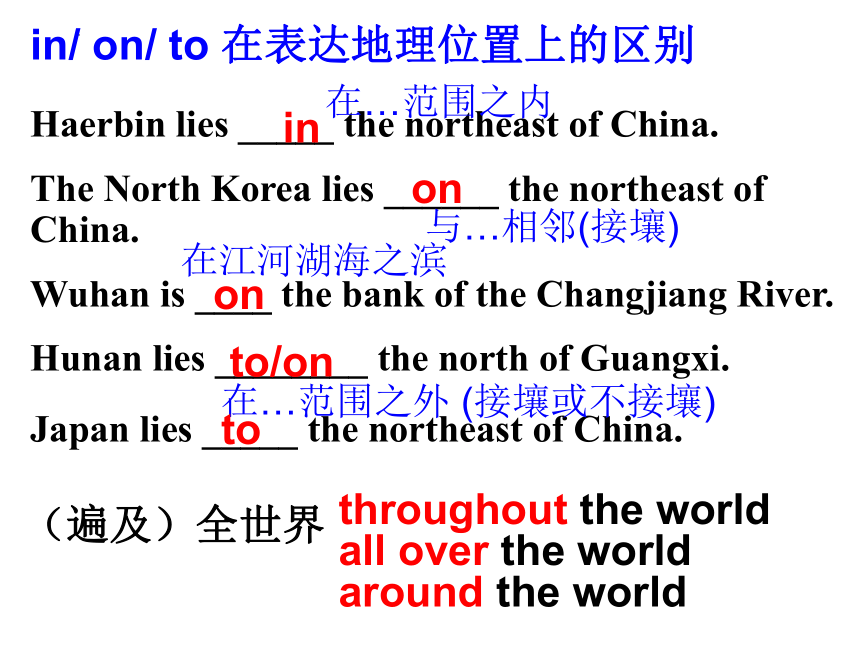
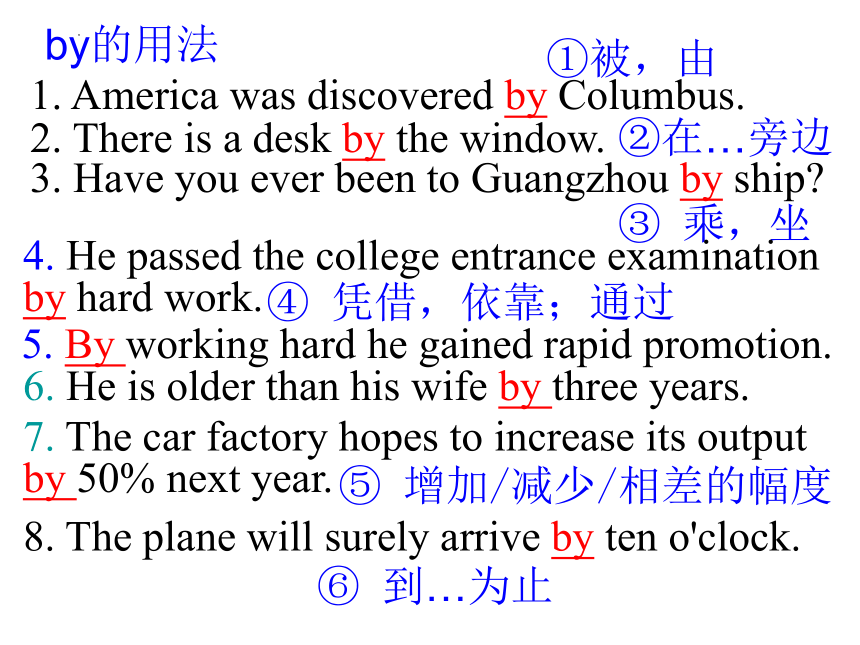
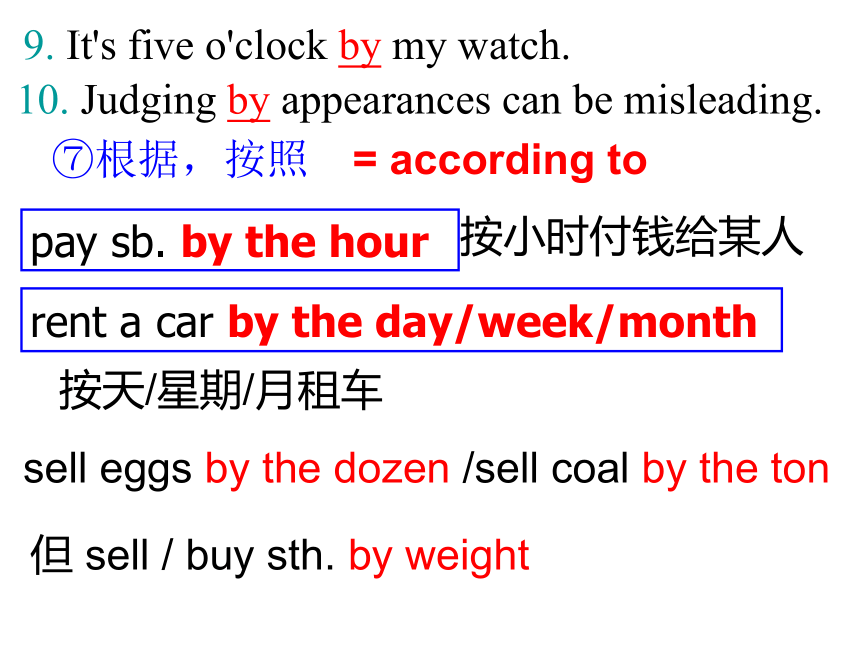
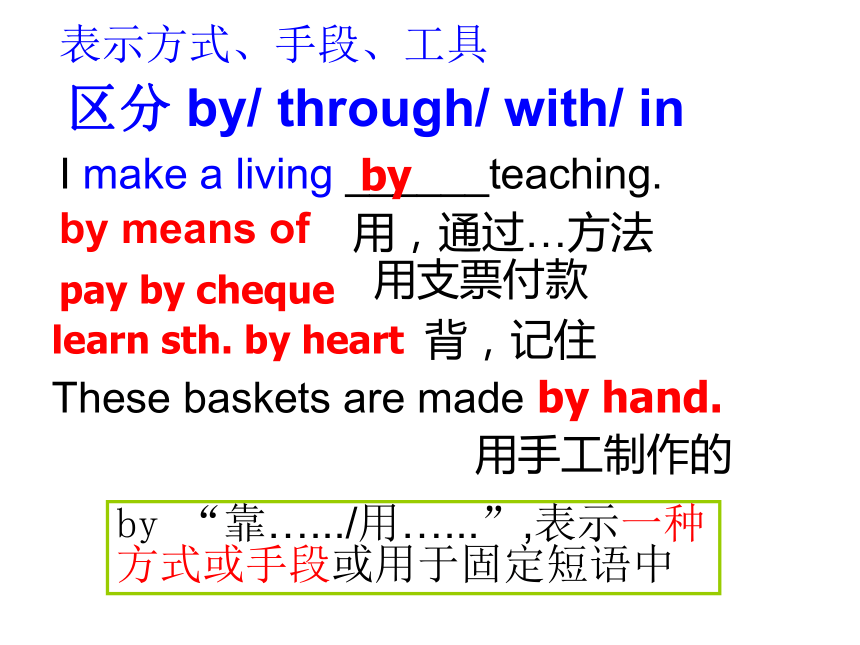
文档简介
(共39张PPT)
介词
介词是用来表明名词、代词与句中其他词的关系的词。
1.是虚词,一般不重读
2.介于vi.与宾语之间或在名词、动名词或代词之前 3.有自己的意思
4.与后面的词共同充当句子的成分。
1.简单介词
2.合成介词
3.双重介词
4.介词短语
1.概念:
3.特征:
2.分类:
4.考点体现 :
5.解题方法
6.容易错误和要注意的地方
1.语法填空(纯空格)
2.作文表达 3.利用介词美化文章
in, at
into, without
He came from behind the door.
thanks to, because of
宾,表,状,定,补
1. Recently the most moving thing is in the earthquake.
2. I saw a girl behind the man.
3. The girl in red is my sister.
4. 1) We live in Guangzhou.
2) She got to school at 9:00.
3) I go back home by bus.
4) The game was put off because of rain.
作表语
作宾补
作定语(后置定语)
作地点状语
作时间状语
作方式状语
作原因状语
介词短语的句法功能
主要功能: 介宾短语通常在句中充当 _______、 _________、___________或者___________。
表语
定语(后置)
宾补
状语
常用介词的用法
在下列空格中填入适当的介词
1.时间上的某一点、某时刻、时间、阶段
___1:00/ dawn/ noon/ the present stage/ the age of 17
2. 1) 具体某一天(的上下午/晚上)或星期几
____ June 20, 2008/ the morning of May 16th
______ weekends ____weekdays
2) ____ hearing the news, she burst into tears.
3.时段,用在世纪/年代/年/月/季节/上午/下午/晚上等词前
1)____ the 21st century/the 1990s/2003/ September/ autumn/ the morning
2)The project will finish ____ three months.
On
at
on
at/on
in
in
On/Upon + doing/one’s +n. 一…….就……
on
注意:
表示时间的词(morning, afternoon, evening, Sunday…)前面有last, next, this, that时,不再用介词
yesterday, today, tonight, tomorrow
前也不再加介词
区分: by/ for / since 在表示时间
You must be back _____ four o'clock.
We have studied English _____ many years.
They have been close friends ____ childhood.
by
for
since
by
for
since
+时间点,到…时候为止,常与完成时连用
+时间段, (动作/状态)持续的时间; 长达多久时间,常与完成时连用
+时间点/+一段时间+ago/时间状从,“自从…时候以来”,也常与完成时连用(主句)
by now/ by the end of last year/by the time sb. does/did sth.
He will be back ___two hours.
He will be back two hours _____.
He will be back ____ two o’clock.
He came back _____ two hours.
in
after
later
after
区分: after/ in / later 表示时间
表将来
in + 一段时间= 一段时间+later
after + 时间点
after+ 一段时间 可用于一般过去时
= 一段时间+later
He came back two hours _____.
later
in/ on/ to 在表达地理位置上的区别
Haerbin lies _____ the northeast of China.
The North Korea lies ______ the northeast of China.
Wuhan is ____ the bank of the Changjiang River.
Hunan lies ________ the north of Guangxi.
Japan lies _____ the northeast of China.
in
on
to/on
在…范围之内
与…相邻(接壤)
在…范围之外 (接壤或不接壤)
(遍及)全世界
throughout the world all over the world around the world
on
在江河湖海之滨
to
by的用法
1. America was discovered by Columbus.
①被,由
2. There is a desk by the window.
3. Have you ever been to Guangzhou by ship
②在…旁边
③ 乘,坐
4. He passed the college entrance examination by hard work.
④ 凭借,依靠;通过
5. By working hard he gained rapid promotion.
6. He is older than his wife by three years.
7. The car factory hopes to increase its output by 50% next year.
⑤ 增加/减少/相差的幅度
8. The plane will surely arrive by ten o'clock.
⑥ 到…为止
⑦根据,按照
9. It's five o'clock by my watch.
10. Judging by appearances can be misleading.
= according to
pay sb. by the hour
按小时付钱给某人
rent a car by the day/week/month
按天/星期/月租车
sell eggs by the dozen /sell coal by the ton
但 sell / buy sth. by weight
表示方式、手段、工具
pay by cheque
用支票付款
learn sth. by heart
背,记住
These baskets are made by hand.
用手工制作的
区分 by/ through/ with/ in
I make a living ______teaching.
by
by “靠….../用…...”,表示一种方式或手段或用于固定短语中
by means of
用,通过…方法
I learned it ________ a friend.
through “通过” 表示一种途径,有时可与by 换用。
He succeeded _________ hard work.
He was writing ______ a pencil.
We see _____ our eyes.
with
with
with “用…...”, 后常接具体有形的物体(具体的工具/身体部位)。
He talks _____ French and writes ____ ink.
in
pay in cash
以现金支付
in 用…(语言/材料)
through
through/by
in
with 的用法:
1. The man went home with a happy heart.
表伴随“带着/有/随着”
2. Some high school students may be required to have an interview with people from the university.
“与…,和…”
3. Her fingers were numb with cold.
表原因
tremble with fear
jump with joy
smile with satisfaction
害怕得发抖
高兴得跳起来
满意地笑
“用…”
表伴随
“冻得发麻”
____ time going by =
as time goes/went by
连词
with 的复合结构:
sth. to do
with sb. doing
sth. done
within
在…范围内 -- (反义词)beyond
It saves time in the kitchen to have things you use a lot ______ easy reach.
在容易到达的范围之内
I wouldn’t have entered this famous
university _________ your help.
with
without
within
隐含的条件句:虚拟语气
by/ in/ with/ on用法归纳
write ____ a pen/ cut ____ a knife
see ____ our eyes
____ English/ ____ your own words
____ a low voice
____ this way
____ bike/ bus/ train/ road/ air/ sea/ land
____ this means
____ the radio/ the phone/ TV
____ the bike/ bus/ train/ ship
with
with
in
in
in
by
by
on
on
with
in
with+工具/人体部位
in+语言/声音/方法way
by+交通工具/方法means
on+媒介/ the+交通工具
要注意的地方
1.With everything (buy), she went out of the store with a full basket happily.
2.She had no trouble (finish)the job.
3.It was late and there wasn’t any
body whom she could turn for help.
with的独立主格结构
bought
finishing
to
介词的省略
定从中的介词提前
have (no) trouble with (没)有困难做某事
turn to Sb for help
向某人求助
for 的用法
表原因
She stared at me for a few seconds and handed back the money.
To pay for the high-tech health care, people can buy health insurance for their pets.
表长达一段时间
为了…
apologize to sb. for sth./doing sth.
We apologize for any inconvenience
caused during the repairs.
我们为维修期间造成的任何不便道歉。
for 的用法
Are you for or against the war
He was too proud to ask his family for help and support.
他自尊心太强,不愿向家人寻求帮助和支持。
ask sb. for sth.问某人要某物
赞成
反对
be in favor of
object to
oppose vt.
be opposed to
for , to
He would do anything ___ his motherland.
Did you mention this __ my father
It’s quite warm today ___ November.
What he told you just now was not new __ me.
for
to
for
to
for表示“为了”
to 表示动作对象, “对, 向”,有方向
for 表示“就某情况而说 ”
to 表示“对某对象而言”
用besides, except, except for, but, apart from填空
We need fifteen more people ________ our team to
do the job.
2._________a desk or two, the classroom was empty.
3.She seldom talked of anything ______ painting.
4.______ his wife, his daughter also went swimming.
5.We all attended the meeting ______ Xiao Li.
6.There is no one here ______ Mary and Tom.
7.Who _____ a fool would do such a thing
besides
Except for
but
Besides
except
but
but
besides: also,another,more,other,else,too
except: 句末 except for:句首或句末
but: every, any, all, everybody, anything,
anywhere, nobody, no, none/who, what, where后
as/ like
在谈到人、事物或动作有相同或共同点时,两者均可用,只是like是介词,用于名词、代词、动名词之前,as是连词,用于从句之前:
______ me, she enjoys all kinds of music.
She enjoys all kinds of music, _____ I do.
在表示职业、身份、作用等时,两者的区别是:as 表示比较的双方同属一类或完全相似,而 like 只表示在某些方面相似。
He worked ______ a slave.
He worked _______ a slave.
as
Like
as
like
介词as
基本含义:“作为,当作”
He works as a doctor.
I treat her as a friend.
You can use that glass as a vase.
The news came as a shock.
She had been there as a child.
引申含义:“像,如同”
They were all dressed as clowns.(打扮成……)
The bomb was disguised as a package.(被伪装成……)
固定搭配:把……看作是……
treat
consider
regard
see
view sb./sth. as …
take
have
look on
think of
above/ over/ on/ below/ under/ in
1.Be careful! There is a snake _____ your head.
2.The sun is _______ the mountain in the east.
3.There is a glass __________ the table.
4.Mr. Brown was _______ his wife in social standing.
5.There are three birds ____ the tree.
6.There are many apples ____ the tree.
7.There is many articles _____ the newspaper.
over
above
on/ under
below
in
on
in
because of/ due to/ thanks to/ owing to
Mistakes _____ carelessness may have serious consequences.
_________ your help, I have made great progress.
I am late __________ the heavy rain.
They decided to postpone the trip, _________ bad weather.
due to
Thanks to
because of
作定语或表语
作状语,位于句首或句尾
多用于句首
owing to
逗号隔开,位于句首或句尾
复习时需注意的要点
1.不及物动词不可带宾语,如需要带宾语,必须先加上
一个适当的介词,使此介词与其后的宾语构成介宾短语。
Please give me a pen to write ______.
Who are you talking _______
2. 介词和动词、形容词、名词等常常构成固定搭配.
be proud _____
pay a visit _____
the key _____ (doing) sth.
_____ the most part 就绝大部分而言,
____ one's surprise ____ surprise
____ anger
____ search ____ ____ one's search ____
with
with/to
of
to
to
for
to
in
with
in
of
in
for
2)I agree the writer because of the writer is telling
us the truth.
3.容易错误的地方
3)On my opinion, I against the idea.
1)The story is about that a man asked for a
second chance .
4) On the next day, the poor man was killed.
介词一般不接加句子,接n./pron./doing
不及物动词要加介词再加宾语 。
介词不可单独作谓语,
时间状语前有the next, the last等不再加介词
that
with
In
of
am
asking
∧
∧
介词是语法填空的一个必考点。
1. I didn’t want to be laughed at for talking to him but I didn’t like leaving him ___his own either.
因on one’s own (=alone)是固定搭配, 所以填on。
on
介词与全国高考
语法填空怎么考?
2.(2015年全国1卷)Instead, I 'd head straight for Yangshuo. For those who fly to Guilin, it's only an hour away __46_ car and offers all the scenery of the better-known city.
by
3. His teacher took a deep drink and thanked his student very much for the sweet water. The young man went home _____a happy heart.
名词a happy heart 在句中不作主语,也不作动词的宾语, 就应是作介词的宾语, 空格处应填介词; 由句意可知, 是指这个年轻人“带着”愉快的心情回家, 表示“带着”用with。
with
4. Jane stopped where a small crowd of men had gathered. She found some good quality pipes ____sale.
固定搭配on sale, 表示“出售”。
on
介词与语法填空:
1. 做语法填空时,若纯空格后是动名词、代词宾格或名词,名词前已经有冠词a/an/the、名词所有格或形容词性物主代词,而它们又不作句子的主语、表语或及物动词的宾语,这个空格就很可能是填介词;
2. 带介词的短语;
解题方法:
高考重点要求:
*介词的含义及在句中的作用。
*介词+宾语构成短语的作用。
*介词短语在句子中的功能的理解。
如何攻克介词这一难关?
1.记住常用介词的意义、用法及区分
2.积累带介词的短语
3.解题时要理解整个句子的意思
Father's Day occurs on the 3rd Sunday in June. The idea for creating a day 1 ____children to honor their fathers began in Spokane, Washington.
语篇填空
1. 表示目的。
for
A woman 2 _____the name of Sonora Smart Dodd thought 3 ___the idea for Father’s Day while listening to a Mother’s Day sermon 4 ___1909.
2. with the name of =named/called(名叫…)。
3. 因think of(想到)是固定搭配。
4. 表示在某年或某月用介词in。
with
of
in
Having been raised 5 ____her father, Henry Jackson Smart, after her mother died, Sonora wanted her father to know how special he was 6 ___ her. It was her father that made all the parental sacrifices and was, 7 ___the eyes of his daughter, a courageous, selfless, and loving man.
5. 在被动语态中表示动词的执行者, 用by。
6. 表示“对于某人来说很特别”用be special to sb.。类似的还有be kind/friendly to sb.等。
7. 表示“在某人的眼中”是in the eyes of sb.。
by
to
in
Sonora’s father was born in June, so she chose to hold the first Father’s Day celebration 8 __ Spokane, Washington 9 ____the 19th of June, 1910.
In 1924 President Calvin Coolidge announced the third Sunday in June 10 ____ Father’s Day. Roses are the flowers for Father’s Day.
8. 表示“在”某个大城市,用介词in。
9. 表示“在”具体某一天用介词on。
10. 表示“当作,作为”,用as。
in
on
as
Thank you!
介词
介词是用来表明名词、代词与句中其他词的关系的词。
1.是虚词,一般不重读
2.介于vi.与宾语之间或在名词、动名词或代词之前 3.有自己的意思
4.与后面的词共同充当句子的成分。
1.简单介词
2.合成介词
3.双重介词
4.介词短语
1.概念:
3.特征:
2.分类:
4.考点体现 :
5.解题方法
6.容易错误和要注意的地方
1.语法填空(纯空格)
2.作文表达 3.利用介词美化文章
in, at
into, without
He came from behind the door.
thanks to, because of
宾,表,状,定,补
1. Recently the most moving thing is in the earthquake.
2. I saw a girl behind the man.
3. The girl in red is my sister.
4. 1) We live in Guangzhou.
2) She got to school at 9:00.
3) I go back home by bus.
4) The game was put off because of rain.
作表语
作宾补
作定语(后置定语)
作地点状语
作时间状语
作方式状语
作原因状语
介词短语的句法功能
主要功能: 介宾短语通常在句中充当 _______、 _________、___________或者___________。
表语
定语(后置)
宾补
状语
常用介词的用法
在下列空格中填入适当的介词
1.时间上的某一点、某时刻、时间、阶段
___1:00/ dawn/ noon/ the present stage/ the age of 17
2. 1) 具体某一天(的上下午/晚上)或星期几
____ June 20, 2008/ the morning of May 16th
______ weekends ____weekdays
2) ____ hearing the news, she burst into tears.
3.时段,用在世纪/年代/年/月/季节/上午/下午/晚上等词前
1)____ the 21st century/the 1990s/2003/ September/ autumn/ the morning
2)The project will finish ____ three months.
On
at
on
at/on
in
in
On/Upon + doing/one’s +n. 一…….就……
on
注意:
表示时间的词(morning, afternoon, evening, Sunday…)前面有last, next, this, that时,不再用介词
yesterday, today, tonight, tomorrow
前也不再加介词
区分: by/ for / since 在表示时间
You must be back _____ four o'clock.
We have studied English _____ many years.
They have been close friends ____ childhood.
by
for
since
by
for
since
+时间点,到…时候为止,常与完成时连用
+时间段, (动作/状态)持续的时间; 长达多久时间,常与完成时连用
+时间点/+一段时间+ago/时间状从,“自从…时候以来”,也常与完成时连用(主句)
by now/ by the end of last year/by the time sb. does/did sth.
He will be back ___two hours.
He will be back two hours _____.
He will be back ____ two o’clock.
He came back _____ two hours.
in
after
later
after
区分: after/ in / later 表示时间
表将来
in + 一段时间= 一段时间+later
after + 时间点
after+ 一段时间 可用于一般过去时
= 一段时间+later
He came back two hours _____.
later
in/ on/ to 在表达地理位置上的区别
Haerbin lies _____ the northeast of China.
The North Korea lies ______ the northeast of China.
Wuhan is ____ the bank of the Changjiang River.
Hunan lies ________ the north of Guangxi.
Japan lies _____ the northeast of China.
in
on
to/on
在…范围之内
与…相邻(接壤)
在…范围之外 (接壤或不接壤)
(遍及)全世界
throughout the world all over the world around the world
on
在江河湖海之滨
to
by的用法
1. America was discovered by Columbus.
①被,由
2. There is a desk by the window.
3. Have you ever been to Guangzhou by ship
②在…旁边
③ 乘,坐
4. He passed the college entrance examination by hard work.
④ 凭借,依靠;通过
5. By working hard he gained rapid promotion.
6. He is older than his wife by three years.
7. The car factory hopes to increase its output by 50% next year.
⑤ 增加/减少/相差的幅度
8. The plane will surely arrive by ten o'clock.
⑥ 到…为止
⑦根据,按照
9. It's five o'clock by my watch.
10. Judging by appearances can be misleading.
= according to
pay sb. by the hour
按小时付钱给某人
rent a car by the day/week/month
按天/星期/月租车
sell eggs by the dozen /sell coal by the ton
但 sell / buy sth. by weight
表示方式、手段、工具
pay by cheque
用支票付款
learn sth. by heart
背,记住
These baskets are made by hand.
用手工制作的
区分 by/ through/ with/ in
I make a living ______teaching.
by
by “靠….../用…...”,表示一种方式或手段或用于固定短语中
by means of
用,通过…方法
I learned it ________ a friend.
through “通过” 表示一种途径,有时可与by 换用。
He succeeded _________ hard work.
He was writing ______ a pencil.
We see _____ our eyes.
with
with
with “用…...”, 后常接具体有形的物体(具体的工具/身体部位)。
He talks _____ French and writes ____ ink.
in
pay in cash
以现金支付
in 用…(语言/材料)
through
through/by
in
with 的用法:
1. The man went home with a happy heart.
表伴随“带着/有/随着”
2. Some high school students may be required to have an interview with people from the university.
“与…,和…”
3. Her fingers were numb with cold.
表原因
tremble with fear
jump with joy
smile with satisfaction
害怕得发抖
高兴得跳起来
满意地笑
“用…”
表伴随
“冻得发麻”
____ time going by =
as time goes/went by
连词
with 的复合结构:
sth. to do
with sb. doing
sth. done
within
在…范围内 -- (反义词)beyond
It saves time in the kitchen to have things you use a lot ______ easy reach.
在容易到达的范围之内
I wouldn’t have entered this famous
university _________ your help.
with
without
within
隐含的条件句:虚拟语气
by/ in/ with/ on用法归纳
write ____ a pen/ cut ____ a knife
see ____ our eyes
____ English/ ____ your own words
____ a low voice
____ this way
____ bike/ bus/ train/ road/ air/ sea/ land
____ this means
____ the radio/ the phone/ TV
____ the bike/ bus/ train/ ship
with
with
in
in
in
by
by
on
on
with
in
with+工具/人体部位
in+语言/声音/方法way
by+交通工具/方法means
on+媒介/ the+交通工具
要注意的地方
1.With everything (buy), she went out of the store with a full basket happily.
2.She had no trouble (finish)the job.
3.It was late and there wasn’t any
body whom she could turn for help.
with的独立主格结构
bought
finishing
to
介词的省略
定从中的介词提前
have (no) trouble with (没)有困难做某事
turn to Sb for help
向某人求助
for 的用法
表原因
She stared at me for a few seconds and handed back the money.
To pay for the high-tech health care, people can buy health insurance for their pets.
表长达一段时间
为了…
apologize to sb. for sth./doing sth.
We apologize for any inconvenience
caused during the repairs.
我们为维修期间造成的任何不便道歉。
for 的用法
Are you for or against the war
He was too proud to ask his family for help and support.
他自尊心太强,不愿向家人寻求帮助和支持。
ask sb. for sth.问某人要某物
赞成
反对
be in favor of
object to
oppose vt.
be opposed to
for , to
He would do anything ___ his motherland.
Did you mention this __ my father
It’s quite warm today ___ November.
What he told you just now was not new __ me.
for
to
for
to
for表示“为了”
to 表示动作对象, “对, 向”,有方向
for 表示“就某情况而说 ”
to 表示“对某对象而言”
用besides, except, except for, but, apart from填空
We need fifteen more people ________ our team to
do the job.
2._________a desk or two, the classroom was empty.
3.She seldom talked of anything ______ painting.
4.______ his wife, his daughter also went swimming.
5.We all attended the meeting ______ Xiao Li.
6.There is no one here ______ Mary and Tom.
7.Who _____ a fool would do such a thing
besides
Except for
but
Besides
except
but
but
besides: also,another,more,other,else,too
except: 句末 except for:句首或句末
but: every, any, all, everybody, anything,
anywhere, nobody, no, none/who, what, where后
as/ like
在谈到人、事物或动作有相同或共同点时,两者均可用,只是like是介词,用于名词、代词、动名词之前,as是连词,用于从句之前:
______ me, she enjoys all kinds of music.
She enjoys all kinds of music, _____ I do.
在表示职业、身份、作用等时,两者的区别是:as 表示比较的双方同属一类或完全相似,而 like 只表示在某些方面相似。
He worked ______ a slave.
He worked _______ a slave.
as
Like
as
like
介词as
基本含义:“作为,当作”
He works as a doctor.
I treat her as a friend.
You can use that glass as a vase.
The news came as a shock.
She had been there as a child.
引申含义:“像,如同”
They were all dressed as clowns.(打扮成……)
The bomb was disguised as a package.(被伪装成……)
固定搭配:把……看作是……
treat
consider
regard
see
view sb./sth. as …
take
have
look on
think of
above/ over/ on/ below/ under/ in
1.Be careful! There is a snake _____ your head.
2.The sun is _______ the mountain in the east.
3.There is a glass __________ the table.
4.Mr. Brown was _______ his wife in social standing.
5.There are three birds ____ the tree.
6.There are many apples ____ the tree.
7.There is many articles _____ the newspaper.
over
above
on/ under
below
in
on
in
because of/ due to/ thanks to/ owing to
Mistakes _____ carelessness may have serious consequences.
_________ your help, I have made great progress.
I am late __________ the heavy rain.
They decided to postpone the trip, _________ bad weather.
due to
Thanks to
because of
作定语或表语
作状语,位于句首或句尾
多用于句首
owing to
逗号隔开,位于句首或句尾
复习时需注意的要点
1.不及物动词不可带宾语,如需要带宾语,必须先加上
一个适当的介词,使此介词与其后的宾语构成介宾短语。
Please give me a pen to write ______.
Who are you talking _______
2. 介词和动词、形容词、名词等常常构成固定搭配.
be proud _____
pay a visit _____
the key _____ (doing) sth.
_____ the most part 就绝大部分而言,
____ one's surprise ____ surprise
____ anger
____ search ____ ____ one's search ____
with
with/to
of
to
to
for
to
in
with
in
of
in
for
2)I agree the writer because of the writer is telling
us the truth.
3.容易错误的地方
3)On my opinion, I against the idea.
1)The story is about that a man asked for a
second chance .
4) On the next day, the poor man was killed.
介词一般不接加句子,接n./pron./doing
不及物动词要加介词再加宾语 。
介词不可单独作谓语,
时间状语前有the next, the last等不再加介词
that
with
In
of
am
asking
∧
∧
介词是语法填空的一个必考点。
1. I didn’t want to be laughed at for talking to him but I didn’t like leaving him ___his own either.
因on one’s own (=alone)是固定搭配, 所以填on。
on
介词与全国高考
语法填空怎么考?
2.(2015年全国1卷)Instead, I 'd head straight for Yangshuo. For those who fly to Guilin, it's only an hour away __46_ car and offers all the scenery of the better-known city.
by
3. His teacher took a deep drink and thanked his student very much for the sweet water. The young man went home _____a happy heart.
名词a happy heart 在句中不作主语,也不作动词的宾语, 就应是作介词的宾语, 空格处应填介词; 由句意可知, 是指这个年轻人“带着”愉快的心情回家, 表示“带着”用with。
with
4. Jane stopped where a small crowd of men had gathered. She found some good quality pipes ____sale.
固定搭配on sale, 表示“出售”。
on
介词与语法填空:
1. 做语法填空时,若纯空格后是动名词、代词宾格或名词,名词前已经有冠词a/an/the、名词所有格或形容词性物主代词,而它们又不作句子的主语、表语或及物动词的宾语,这个空格就很可能是填介词;
2. 带介词的短语;
解题方法:
高考重点要求:
*介词的含义及在句中的作用。
*介词+宾语构成短语的作用。
*介词短语在句子中的功能的理解。
如何攻克介词这一难关?
1.记住常用介词的意义、用法及区分
2.积累带介词的短语
3.解题时要理解整个句子的意思
Father's Day occurs on the 3rd Sunday in June. The idea for creating a day 1 ____children to honor their fathers began in Spokane, Washington.
语篇填空
1. 表示目的。
for
A woman 2 _____the name of Sonora Smart Dodd thought 3 ___the idea for Father’s Day while listening to a Mother’s Day sermon 4 ___1909.
2. with the name of =named/called(名叫…)。
3. 因think of(想到)是固定搭配。
4. 表示在某年或某月用介词in。
with
of
in
Having been raised 5 ____her father, Henry Jackson Smart, after her mother died, Sonora wanted her father to know how special he was 6 ___ her. It was her father that made all the parental sacrifices and was, 7 ___the eyes of his daughter, a courageous, selfless, and loving man.
5. 在被动语态中表示动词的执行者, 用by。
6. 表示“对于某人来说很特别”用be special to sb.。类似的还有be kind/friendly to sb.等。
7. 表示“在某人的眼中”是in the eyes of sb.。
by
to
in
Sonora’s father was born in June, so she chose to hold the first Father’s Day celebration 8 __ Spokane, Washington 9 ____the 19th of June, 1910.
In 1924 President Calvin Coolidge announced the third Sunday in June 10 ____ Father’s Day. Roses are the flowers for Father’s Day.
8. 表示“在”某个大城市,用介词in。
9. 表示“在”具体某一天用介词on。
10. 表示“当作,作为”,用as。
in
on
as
Thank you!
